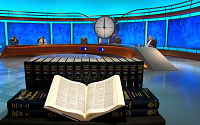Due to persistent vandalism, account creation has been suspended. If you would like an account, please contact Charlie Reams on Apterous.
Difference between revisions of "Oxford English Dictionary"
Mclarenguy22 (talk | contribs) m |
TobyMcDonald (talk | contribs) m |
||
| Line 4: | Line 4: | ||
The '''Oxford English Dictionary (OED)''' is a set of twenty volumes of printed dictionaries representing the principal historical dictionary of the English language. It was the main prize awarded to [[Series Winners|series champions]] of [[Countdown|''Countdown'']] up to and including [[Series 83]], after which the prize was axed due to the books being considered out of date. | The '''Oxford English Dictionary (OED)''' is a set of twenty volumes of printed dictionaries representing the principal historical dictionary of the English language. It was the main prize awarded to [[Series Winners|series champions]] of [[Countdown|''Countdown'']] up to and including [[Series 83]], after which the prize was axed due to the books being considered out of date. | ||
| − | The prize, worth approximately £4,000, was on display in each | + | The prize, worth approximately £4,000, was on display in each series Grand Final. In the final of [[Series 1]], [[Joyce Cansfield]] was awarded thirteen volumes. [[Series 31]] champion [[David Acton]] refused the prize on the grounds of strict veganism, instead opting for a CD-ROM version. The books were leather-bound until [[Series 63]]. |
The full unabridged OED is never used for adjudication for the [[letters game|letters games]] on the show (including the OED website), which has always favoured shorter and more convenient Oxford resources for word game and television purposes. Historically, the show began using the Concise Oxford English Dictionary (COD) before replacing it with a larger book, the [[Oxford Dictionary of English|Oxford Dictionary of English (ODE)]], in 2000; since 2014, the show has used [[Oxford Dictionaries Online|Oxford Dictionaries Online (ODO)]] on a laptop, which also replaced the [[pencam]]; ODO contains words than cannot be found in OED nor ODE. | The full unabridged OED is never used for adjudication for the [[letters game|letters games]] on the show (including the OED website), which has always favoured shorter and more convenient Oxford resources for word game and television purposes. Historically, the show began using the Concise Oxford English Dictionary (COD) before replacing it with a larger book, the [[Oxford Dictionary of English|Oxford Dictionary of English (ODE)]], in 2000; since 2014, the show has used [[Oxford Dictionaries Online|Oxford Dictionaries Online (ODO)]] on a laptop, which also replaced the [[pencam]]; ODO contains words than cannot be found in OED nor ODE. | ||
Revision as of 20:24, 28 August 2021
- Oxford English Dictionary (OED) is separate to Oxford Dictionary of English (ODE) and Oxford Dictionaries Online (ODO).
The Oxford English Dictionary (OED) is a set of twenty volumes of printed dictionaries representing the principal historical dictionary of the English language. It was the main prize awarded to series champions of Countdown up to and including Series 83, after which the prize was axed due to the books being considered out of date.
The prize, worth approximately £4,000, was on display in each series Grand Final. In the final of Series 1, Joyce Cansfield was awarded thirteen volumes. Series 31 champion David Acton refused the prize on the grounds of strict veganism, instead opting for a CD-ROM version. The books were leather-bound until Series 63.
The full unabridged OED is never used for adjudication for the letters games on the show (including the OED website), which has always favoured shorter and more convenient Oxford resources for word game and television purposes. Historically, the show began using the Concise Oxford English Dictionary (COD) before replacing it with a larger book, the Oxford Dictionary of English (ODE), in 2000; since 2014, the show has used Oxford Dictionaries Online (ODO) on a laptop, which also replaced the pencam; ODO contains words than cannot be found in OED nor ODE.
External Links
- OED website [1]
